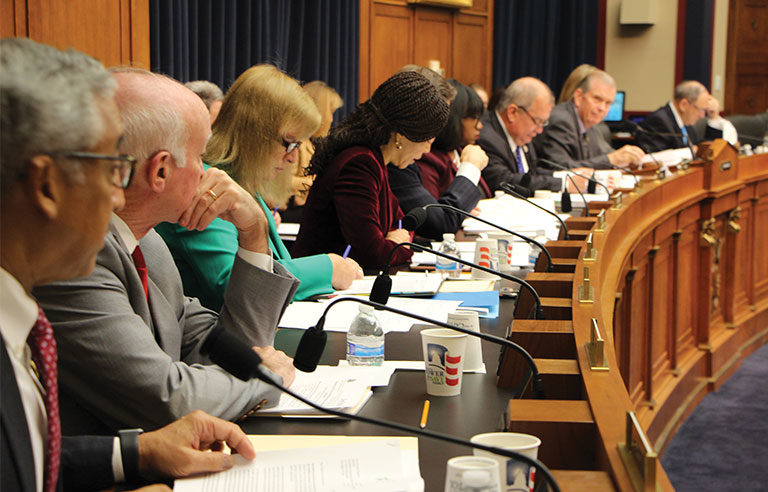Paid sick leave opt-out bill debated during House committee hearing

Paid sick leave notably figured into the discussion of the Workflex in the 21st Century Act (H.R. 4219), introduced Nov. 2 by Reps. Mimi Walters (R-CA), Elise Stefanik (R-NY) and Cathy McMorris Rodgers (R-WA).
Currently, eight states, the District of Columbia and a number of localities guarantee paid sick leave for workers. Montgomery County (MD) Council President Hans Riemer (D), whose county is among that number, was critical of the bill during his testimony, claiming it would “create an off-ramp for employers to evade state and local laws presently covering millions of people.”
“We strongly oppose H.R. 4219, which would undermine our paid sick days law and turn back the clock for more than 13 million working people who have gained access to paid sick days through laws passed in eight states and 32 local jurisdictions,” Riemer said. “H.R. 4219 does not provide paid sick days – it takes them away. H.R. 4219 takes away important rights to sick leave that local and state governments have granted to their residents – rights that were granted using sovereignty that belongs to us.”
Bill supporters include Barbara Brickmeier, vice president for human resources and business development at Armonk, NY-based IBM Corp. Brickmeier said nearly all of the various paid sick leave requirements – in addition to a federal Executive Order granting paid sick leave to federal contractors – apply to IBM employees. Further, each requirement is different, creating what Brickmeier called “a complex obstacle course for employers, particularly multistate employers.”
“Instead of facilitating the formulation of paid sick leave policies,” Brickmeier said, “these inconsistencies and competing requirements actually discourage companies from voluntarily providing paid sick leave and/or paid family leave to their employees. … As a result of the uncoordinated patchwork of requirements that exists today, IBM and similarly situated companies are left with no choice but to provide different paid sick time and family leave benefits based on where an employee works.”
Angela Schaefer is vice president of human resources for St. Louis, MO-based Safety National, described on its website as “a leading provider of alternative risk funding products.” Schaefer testified on behalf of the Society of Human Resource Management, which supports the bill.
“The SHRM-supported legislation expands paid leave to all employees and provides Workflex options,” a press release from SHRM states. “It gives employers more certainty and predictability over their leave practices, rather than having to comply with the current, fragmented patchwork of state and local laws. SHRM believes this bill would give employees the job flexibility they are seeking, while providing employers more predictability.”
Opposition groups include the National Partnership for Women and Families, which cited data from the Bureau of Labor Statistics showing that more than 37 million U.S. workers lack access to paid sick leave.
“This bill is a poorly disguised attempt to take away guaranteed sick days at a time when the evidence that paid sick days standards benefit working people and their families, businesses and communities, as well as our economy and our public health, is strong and growing,” NPWF President Debra Ness said in a Nov. 2 press release. “Paid sick day laws set baselines that guarantee people can earn a certain amount of paid time away from their jobs to recover from common and contagious illnesses, care for a child or loved one who is ill, get preventive care, and, often, seek assistance and treatment related to domestic violence, sexual assault or stalking.
“In contrast, Walters’ proposal would deny workers any certainty by allowing companies to ‘opt-out’ of state and local paid sick days laws if they claim to offer some paid time off, without providing workers any real right to that time.”
In his closing statement, Rep. Tim Walberg (R-MI), chair of the House Health, Employment, Labor and Pensions Subcommittee, cited the uncertainties that must be addressed.
“We have questions in this area and we have needs,” Walberg said. “Questions such as, can employers be trusted to make good paid time off decisions for both themselves and their employees? Or, can we develop productive paid time off legislation that fosters good relations between employees and employers, while not violating our constitutional federalism in regards to the state and local primacy? And that is an important question to consider.”
Post a comment to this article
Safety+Health welcomes comments that promote respectful dialogue. Please stay on topic. Comments that contain personal attacks, profanity or abusive language – or those aggressively promoting products or services – will be removed. We reserve the right to determine which comments violate our comment policy. (Anonymous comments are welcome; merely skip the “name” field in the comment box. An email address is required but will not be included with your comment.)

